
Textbook for Age of Revolution period to include works by selected authors.
- Subject:
- Literature
- Material Type:
- Textbook
- Author:
- Colleen McCready
- Date Added:
- 12/16/2021

Textbook for Age of Revolution period to include works by selected authors.

This textbook covers the Romanticism period with works from selected authors.

This is a textbook covering the Realism period with works from selected authors.

Modern World LIterature textbook that covers the Modernism period with works from selected authors.
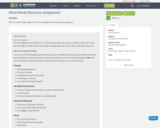
This is a multi-modal assignment to use alongside a narrative essay assignemnt.

Hello and welcome to the MyOpenMath Help Workshop. Register for an account using the typed description or view the video on the playlist titled “How to Register as an Instructor”. The MyOpenMath Help Video playlist provides a multitude of videos teaching users how to do everything they need to use MyOpenMath successfully in the classroom. It is more than a workshop, it is a tool box for success.

This resource provides lecture notes and writing assignments for the study of a novel - in this case, Aldous Huxley's Brave New World. These notes and assignments, however, can be adapted and applied to practically any novel. Unless otherwise noted, this resource is licensed under CC BY-NC-SA.
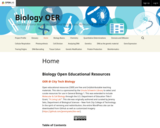
The laboratory activities on this page can be used with the TBR BIOL 1010 OER course modules. Refer to the TBR BIOL 1010 OER course syllabus to match laboratory activities with course modules.
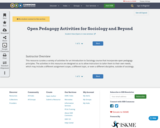
This resource curates a variety of activities for an Introduction to Sociology course that incorporate open pedagogy principles. The activities in this resource are designed so as to allow instructors to tailor them to their own needs, which may include a different assignment scope, a different topic, or even a different discipline, outside of sociology.
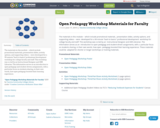
The materials in this module -- which include promotional materials, presentation slides, activity options, and supporting videos -- were developed for a 90-minute "back to basics" professional development workshop for college faculty and staff. This workshop was co-led by an Instructional Designer and OER Librarian. The information serves as an introduction to open pedagogy and student-driven assignments, with a particular focus on students sharing, in their own words, how open pedagogy boosted their learning experience.
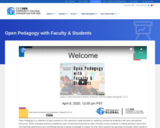
Open Pedagogy is a collection of open practices in the classroom made possible by replacing commercial textbooks with open educational resources. These emerging practices enabled by open content licensing (and an open mindset) involve students in making decisions about their own learning experiences and contributing directly to global knowledge to impact not only other students but generate renewable value outside of the classroom.
This is a recording of a webinar presented by three faculty members and two students who have participated in open pedagogy projects that were enabled through the adoption of open education resources and open practices. Learn how students working with instructional designers and librarians have begun to help faculty adopt, create and implement open content across their campus.
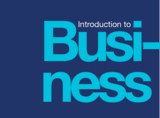
Introduction to Business covers the scope and sequence of most introductory business courses. The book provides detailed explanations in the context of core themes such as customer satisfaction, ethics, entrepreneurship, global business, and managing change. Introduction to Business includes hundreds of current business examples from a range of industries and geographic locations, which feature a variety of individuals. The outcome is a balanced approach to the theory and application of business concepts, with attention to the knowledge and skills necessary for student success in this course and beyond.
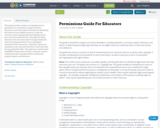
This guide provides a primer on copyright and use permissions. It is intended to support teachers, librarians, curriculum experts and others in identifying the terms of use for digital resources, so that the resources may be appropriately (and legally) used as part of lessons and instruction. The guide also helps educators and curriculum experts in approaching the task of securing permission to use copyrighted materials in their classrooms, collections, libraries or elsewhere in new ways and with fewer restrictions than fair use potentially offers. The guide was created as part of ISKME's Primary Source Project, and is the result of collaboration with copyright holders, intellectual property experts, and educators.

Many of us have likely heard the expression “government of the people, by the people, for the people.” Yet, it is the people who are often excluded from the public policy process. Citizen engagement is typically reactive rather than proactive and passive as opposed to active. Voting and protesting are not the only ways that governments hear the voices of the people. Voting allows citizens to choose individuals who represent their interests, yet their interests are not always represented in ways they desire. Protesting brings attention to issues but doesn’t always lead to problems being solved. This book aims to empower readers to be active participants in the policy process rather than centering elected officials, appointed officials or bureaucrats as the only sources of policy power. This book is written in the spirit of equity. In order to have equitable public policies the voices of those who are impacted by these policies need to be heard as “gaps exist between the services governments deliver and what citizens want or need” (Mintrom & Luetjens, 2018, pg. 122). This is not simply a matter of contributing to policy discourse, but perhaps more importantly, a matter of contributing to the design, development and evaluation of public policy. Further, it is about holding policy makers and other decision makers accountable for their actions and the results of the actions. This book draws from lessons learned from my practical experiences, teaching and research. It is my hope that it equips those on the front lines of public policy and social equity with the tools needed to be effective producers and consumers of public policy ideas.
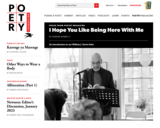
This website has public access to thousands of poems.

This resource provides lecture notes and writing assignments for the study of poetry. While specific poems are presented here, these notes and assignments can be adapted and applied to practically any thematic group of poems. The unit contains several modules. The first posits the work of African American poet Langston Hughes as poems that establish a legacy of oratorical poems addressing social issues faced not only by African Americans, but by any and all Americans, especially the historically disenfranchised. The unit explores poems in Hughes' legacy, focusing on three poems by African American poets Maya Angelou, Elizabeth Alexander, and Amanda Gorman, who composed U.S. presidential inaugural poems. The second module explores nature poetry. Students read and analyze poems that explore, ponder and sometimes celebrate the relationship between human beings and nature. Ultimately, students compose poetry explication essays. The third module explores the book-length prose poem "I Remember" (Joe Brainard), teaching students to locate and make use of peer-reviewed articles. Additionally, students write their own "I Remember" poems. Included are introductory lecture, discussion , short writing, explication , and several other assignments. Unless otherwise noted, the materials in this unit are licensed under CC BY-NC-SA.
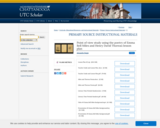
This lesson plan is meant to be a follow up to lesson plan one pertaining to Emma Bell Miles’ and Thoreau’s poetry. This lesson is meant to focus on the authorial Point of View that comes through in these author’s poetry. This lesson also discusses different literary periods from the times of these authors.
This lesson plan is meant to follow the structure of using the author background video, the point of view video, and then the handout. A good follow up would be giving the students a journal prompt to write about and expand on one of the topics from the handout. A longer project could be created where students present on one of the topics from the handout.

“National People’s Party Platform, Adopted at Omaha, Neb., July 4, 1892.” The World Almanac 1893, Press Publishing Company, New York, 1893. Pg. 83-85. Accessed at https://archive.org/details/worldalmanac1893newy/page/82/mode/2up Oct. 25, 2021. This work is in the Public Domain
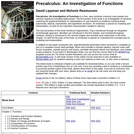
Precalculus: An Investigation of Functions is a free, open textbook covering a two-quarter pre-calculus sequence including trigonometry. The first portion of the book is an investigation of functions, exploring the graphical behavior of, interpretation of, and solutions to problems involving linear, polynomial, rational, exponential, and logarithmic functions. An emphasis is placed on modeling and interpretation, as well as the important characteristics needed in calculus.
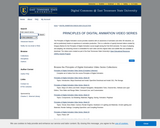
The Principles of Digital Animation course provides students with an awareness of animation and other 3D industries, as well as preliminary hands-on experience in animation production. This is a collection of openly licensed videos created by Gregory Marlow for the Principles of Digital Animation course taught during the Fall 2019 semester. For ease of adopting and adapting, the streaming version is embedded for each video and the original video and subtitle files are available to download.